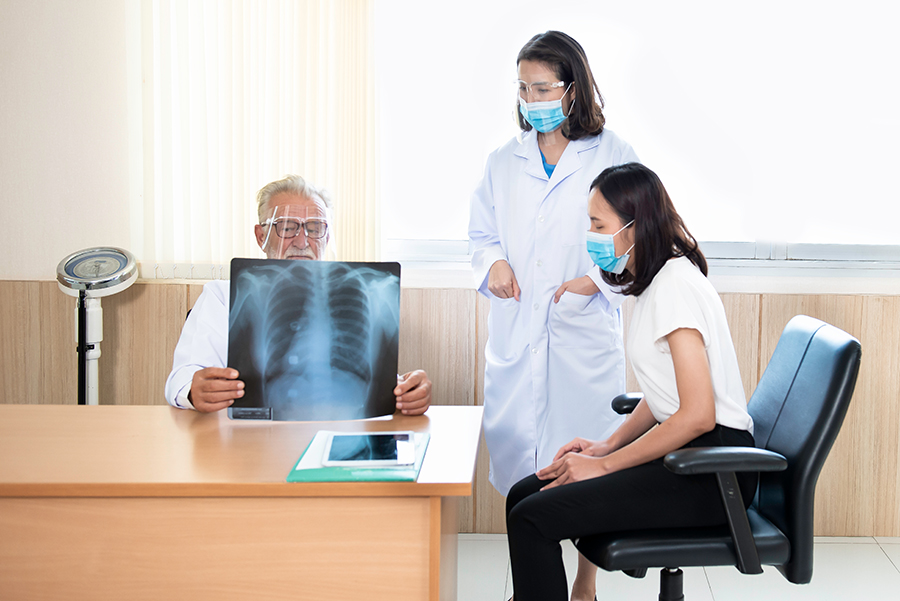Respiratory diseases in humans can be caused by viral or bacterial infections that affect the lungs. Respiratory diseases cause sufferers to wheeze which makes it difficult for them to speak. In addition, patients often experience a fever as well. Respiratory diseases can be transmitted through droplets from coughing or sneezing. So how to prevent diseases in human respiration? In general, one of the best ways to prevent the spread of respiratory infections is to avoid contact with droplets or secretions of saliva, mucus, and tears. Other prevention methods, see the following explanation!
Respiratory diseases in humans can be caused by viral or bacterial infections that attack the lungs.
Read also: How to prevent lung diseases?
How to prevent human respiratory diseases with a healthy lifestyle?
The cause of respiratory disease in humans can be triggered by several things, ranging from hereditary genes, to age factors, to direct transmission of the infection. Respiratory diseases cause sufferers to have difficulty breathing and speaking due to shortness of breath. Respiratory diseases can be prevented by changing an unhealthy lifestyle into a healthy one. Healthy lifestyle that can be done, including:
1. Stop smoking
Smoking habit it can increase the risk of a number of diseases, such as lung cancer. Substances in cigarettes are toxic and karisnogenic (cause cancer) if they enter the lungs. Avoid smoking and never try it. However, if you’re still in the habit of smoking, it’s never too late to quit. There are several health programs that can be followed to quit smoking.
2. Wash your hands diligently
To wash hands with soap and running water can help prevent and avoid most infectious diseases. Viruses and bacteria are also commonly found in crowded places or hospitals. Wash your hands diligently several times a day, especially before eating and after urinating or defecating to prevent viruses or bacteria from entering the nose or mouth.
3. Cover your mouth and nose
Covering your mouth and nose with a tissue when sneezing or coughing can help stop the spread of the virus. The virus that is released when someone sneezes or coughs can easily spread through the air and infect other people. When we are inside cough condition or influence it would be better to get plenty of rest at home, eat well and reduce stress levels.
Read also: Inflammation of the lungs (pneumonia) that must be observed
4. Keep the house clean
Air fresheners, mold, pet hair, and building materials can potentially cause breathing problems. Turn on the fan while cooking and avoid using aerosol products, such as hairspray or excessive perfume. Regularly replace your oven air filter or switch to a gas stove. Keeping your home clean can prevent respiratory diseases from developing.
5. Put on a mask
Use a mask while working or performing high mobility. Exposure to dust, cigarette smoke or vehicle fumes, gases, chemicals, and paint can increase the risk of developing respiratory disease. Regularly perform lung screening and other health programs to check for and detect respiratory diseases early.
Also, minimize close contact with people with respiratory illnesses, such as coughing or sneezing. Also avoid sharing eating or drinking utensils, toothbrushes and towels with other people. Another prevention you can do is also one of them is with vaccines (for: increase the immunity of the body against some diseases). Contact local health professionals to find out and obtain the desired vaccine.

Routine examinations can identify emerging infections so that treatment can be treated early.
Read also: Treatment of wet lungs
How to prevent human respiratory diseases?
The prevention of human respiratory diseases can also be carried out with regular checks by the doctor. This is especially true for lung diseases, which are sometimes not detected until symptoms become serious and severe. During the exam, the healthcare professional will listen to complaints related to breathing. Routine exams can also identify the first infection so your doctor can treat it early. flu shot, pneumonia vaccineand other vaccinations can also be discussed and requested from healthcare professionals.
Vaccines can be given to both children and adults. Vaccines administered can ward off more than 70% of the causes of respiratory diseases. Vaccination is recommended for those who have never been infected with a respiratory disease, such as flu, pneumonia, chronic obstructive respiratory disease (COPD)and other.
Read also: Know the 8 taboos for wet lungs
Respiratory diseases in humans can be caused by viral and bacterial infections that affect the structure of the lungs. How to prevent human respiratory diseases? The spread of respiratory infections can be prevented by changing a healthy lifestyle, regularly checking and vaccinating the local health service.
A healthy lifestyle that can be started, such as quitting smoking, washing your hands with soap, covering your mouth and nose when sneezing or coughing, keeping the house clean and wearing a mask. Also, check with your doctor regularly even when you are in good health. Running flu shots, pneumonia vaccines, and other vaccinations can prevent respiratory infections. Come, love and acknowledge the health of others’ bodies so that they are not susceptible to disease. Participate in a vaccination program to strengthen our immune system.
It was reviewed by Dr. John thunder
Source:

